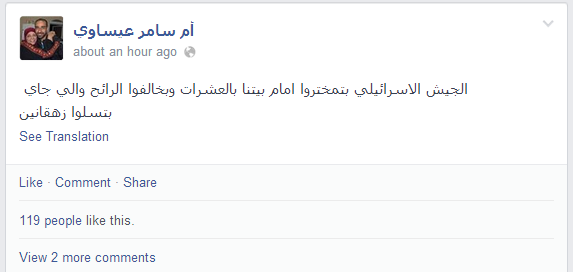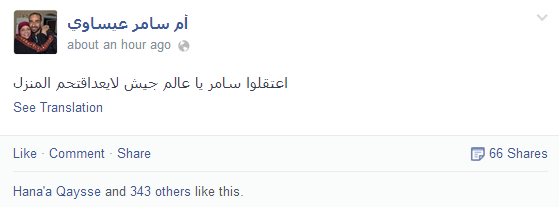Rights and Accountability 23 June 2014

Samer Issawi is one of dozens of prisoners released in exchanges that Israeli forces have rearrested in recent days.
APA imagesThe former Palestinian political prisoner and hunger striker Samer Issawi was detained by Israeli occupation forces on Monday night, according to his family.
Shortly before 7:00pm, Layla Issawi, his mother, posted a Facebook status: “Tens of Israeli army officers are in front of our house passing out tickets to everyone passing by. They must be bored.”
The family lives in the occupied Jerusalem-area village of Issawiyeh.

Layla Issawi, mother of Samer, wrote on Facebook: “Tens of Israeli army officers are in front of our house passing out tickets to everyone passing by. They must be bored.”
His father, Tareq Issawi, told The Electronic Intifada that some “dozens of officers and soldiers” showed up and took him from his brother Medhat’s home around 7:00pm.
Minutes later his mother posted another Facebook status confirming the arrest. “World, they arrested Samer. The military in big numbers raided the house,” she wrote.
According to his family, when Israeli authorities interrogated his younger brother Shadi earlier in the day he was told to inform Samer to come in for interrogation.

His mother wrote, “World, they arrested Samer. The military in big numbers raided the house.”
It remains unclear whether Samer is being rearrested or will be released after interrogation.
Issawi was released from Israeli prison last December, where he was held for 17 months of detention without charge or trial. He was freed as part of an agreement with the Israeli prison authorities reached in the previous April after he refused food for 266 days.
The Issawi family has been targeted for arrest time and again by Israeli occupation authorities. Samer’s sister Shireen Issawi is presently awaiting trial in Israeli prison for allegedly passing information between Palestinian political prisoners and parties deemed “hostile” by Israel, as The Electronic Intifada reported in May.
Speaking to The Electronic Intifada about Shireen, Layla Issawi said that “the charges are false.”
Israel has progressively intensified a widespread crackdown on Palestinians in the occupied West Bank since three Israeli youths reportedly went missing on 12 June while hitchhiking between Jewish-only colonies in the Hebron area.
Samer’s detention comes at a time when Israeli occupation authorities have arrested at least 471 Palestinians, including children and former prisoners, as reported by Ma’an News Agency. Meanwhile, five Palestinians have also been killed by live ammunition fired by Israeli soldiers in the occupied West Bank.
“Arrest anyone”
In addition to Samer Issawi, an estimated 52 former prisoners released during the October 2011 Gilad Shalit prisoner swap agreement have been rearrested, according to Gavan Kelly, an advocacy officer for Addameer Prisoner Support Network.
“Seven of these detainees already went before an Israeli court in Haifa and are being tried on previous charges [from before their 2011 release] as per Israel’s Military Order 1651,” Kelly told The Electronic Intifada, referring to a mandate that allows former Palestinian prisoners to be retried on the same charges after being released from prison.
“This basically proves that the Israelis were planning for something like this,” he added. “They already had the idea in mind that they could rearrest anyone released in that agreement and others. It is very important to note that the evidence used against [Palestinians] in these military courts is ‘secret.’ And most of them risk being reissued prison sentences that are very long.”
As of 1 May, 192 Palestinians were being held in administrative detention on “secret evidence” without trial, according to Addameer’s statistics. Another 104 administrative detention orders have been confirmed since Israel began its latest military offensive against last week.
Kelly further explained that Israel was exploiting the missing Israeli teenagers in order to acheive political and military aims, including dismantling infrastructure in the occupied West Bank that is associated with the Palestinian political organization Hamas.
Hamas, considered illegal by Israel, recently signed a reconciliation deal with the Fatah-dominated Palestinian Authority in the West Bank. “The Israelis are trying to break the reconciliation,” said Kelly.
“They are also striking at the hunger strikers, whose sole demand is to end the use of administrative detention,” Kelly explained, referring to a mass hunger strike by some 125 Palestinian prisoners that has lasted more than 60 days so far.
Israel’s parliament, the Knesset, is considering a bill that will allow Israeli prison authorities to force-feed hunger-striking Palestinian political prisoners. Force-feeding is considered torture by the World Medical Association.
Israel’s rightwing Prime Minister Benjamin Netanyahu recently defended force-feeding. Reporting that Netanyahu wanted to expedite the bill, Israel’s Channel 2 quoted him justifying the bill by saying that “in Guantanamo the Americans are using the method of force-feeding too.”
“It is quite worrisome to think what will happen in coming days,” Addameer’s Kelly said.
Collective punishment
Palestinian, Israeli and international human rights groups have denounced Israel for its “collective punishment” against Palestinians.
A joint letter issued by eleven organizations called on Israel “to refrain from collectively punishing the civilian Palestinian population in the West Bank and the Gaza Strip” during its ongoing military offensive.
Yet Israeli occupation forces have raided cities, towns, villages and refugee camps across the occupied West Bank. Universities, cultural centers and religious institutions have been raided.
Along with others, Birzeit University, Al-Quds University and the American Arab University in Jenin have all been raided by military forces.
In the Bethlehem-area Dheisheh refugee camp, a the Ibdaa cultural center was ransacked by soldiers after they rounded and detained dozens of residents in the camp. They stole computers, a projector, files and money, among other items.
As Israeli soldiers were accompanied by Palestinian Authority police while they attacked Palestinians in Ramallah with live ammunition, they also broke into the offices of the Russia Today media organization and several other news outlets. One Palestinian was killed in Israel’s raid on Ramallah.
Mainstream Israeli politicians have defended the military’s actions and called to increase the violence.
Former chief military rabbi Avihai Ronsky defended Israel’s collective punishment measures. On his Facebook page, he reportedly wrote:
“Only with a sharp blow will we make it clear that Jewish blood is not cheap. The same goes today: only by dropping an atomic bomb on Hiroshima and Nagasaki, which caused millions of deaths, did the US bring an end to World War II.”
Danny Danon, a former settler leader and deputy defense minister, called on Israel to “shut off the power for a few days.” Due to Israel’s suffocating restrictions, Palestinians in the occupied West Bank and the besieged Gaza Strip are dependent on Israel for electricity.
Such politicians enjoy widespread support among an increasingly rightwing and anti-Palestinian Israeli public, as demonstrated by a new Facebook page with more than 20,000 followers that calls for the murder of a Palestinian “each hour” until the three missing teenagers are located.






Comments
It is not a punishment
Permalink Sami replied on
It is not a crime, a sin, nor a mistake to live in your land and to resist the occupation. It is a human right and a sacred duty.
Arresting people exercising their rights and duties is not a collective punishment. It is a collective crime. The Zionist terrorist gangs are the ones who should be punished for their crimes.